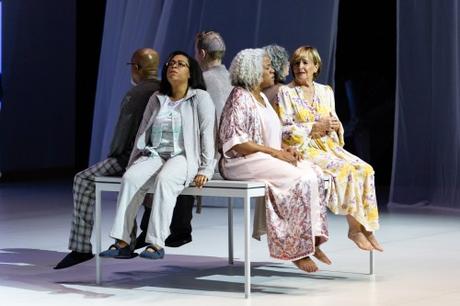Operatoonity.com review: Sky on Swings, a world premiere, presented by Opera Philadelphia
Live performance: Saturday, September 29, 1:30 p.m.
The Perelman Theater, Philadelphia, PA
Music: Lembit Beecher
Libretto: Hannah Moscovitch
5.0 out of 5.0 stars

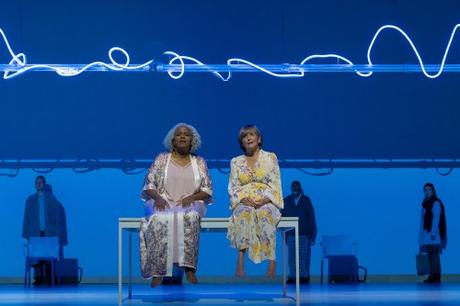
Marietta Simpson as “Martha” and Frederica von Stade as “Danny” in the world premiere of Sky on Swings | Photo courtesy of Opera Philadelphia by Steven Pisano
This reviewer knows plenty of otherwise intelligent and educated individuals who dismiss opera as a stale and stuffy art form, irrelevant to contemporary society, and far removed from modern-day sensibilities. Opera’s dull and boring or horribly melodramatic. It’s not for me–it’s for old people, I have heard some say.
After all, who among us steps off a carriage in the 21st century, quickly takes the measure of another personage, and instantly falls in love (Manon Lescaut)? Yes, while the music can be breathtaking, some of the story lines of operas commonly produced in the repertoire are implausible, I will have to admit.
Enter Sky on Swings. It is a brand new work that is relevant, plausible, and gut-wrenching. I can’t recall any dramatic work I have seen recently (opera, film, play) when tears streamed down my face uncontrollably for nearly an entire act. While it features older adults–the only opera headlined by two female mature vocalists, purportedly–it is hardly a show written for senior audiences. I am sure it frightened the hell out of all the senior adults in attendance. Its message, however, rings loud and clear to younger people–don’t take your sensibilities for granted, ever.
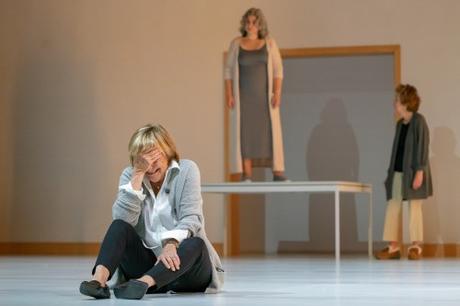
Frederica von Stade plays a woman whose Alzheimer’s progresses rapidly throughout the one-act opera. | Photo courtesy of Opera Philadelphia by Steven Pisano
Sky on Swings was so arresting, I couldn’t rein in the mounting sense of loss as two older women descend into the mental abyss that is Alzheimer’s disease. An abyss that thrives in neurological tangles of the brain, its tangles artistically evoked with a thin neon tube spanning the length of the stage, wrapped erratically in white wire. This novel set piece lowered to the stage floor as the characters descended further and further into the ravages of the disease.
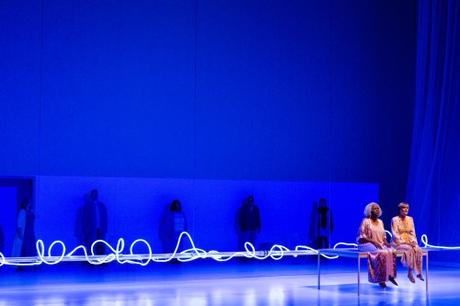
A neon bar wrapped in tangles gradually descended to the stage floor as the disease consumed the principal characters. | Photo courtesy of Opera Philadelphia by Dominic M. Mercier
Opera Philadelphia’s billed this chamber opera as an “unflinching exploration of Alzheimer’s.” Such a bold claim was no embellishment. The show is not one where the viewpoint characters are the loved ones with all their faculties intact, merely watching their parents waste away. Rather, the opera delves into the point of view of the Alzheimer’s victims themselves as their cognitive abilities vacate them.
Lembit Beecher and Hannah Moscovitch collaborated previously on a chamber opera Opera Philadelphia presented in O17 called I Have No Stories to Tell You. This opera also had a seamless quality to it, with libretto and score each enriching the other.
As this artistic juggernaut of music and lyrics progressed–its breathtaking performances, inspired stage direction (Joanna Settle), and exceptional production values–this piece revealed itself to be a tour de force.
Besides the sense of oblivion conveyed by the azure-blue lighting effects (Pat Collins, lighting design) and sparing set pieces (Andrew Lieberman, set design), the principal performers –“Martha” sung by mezzo Marietta Simpson and “Danny”– sung by mezzo Frederica von Stade pulled you into their painfully intimate devolution from anger to despair to childlike immersion to resignation, and for Martha, to the grave.
When the audience meets Martha, she is in the throes of a full-on hallucination because her Alzheimer’s is more advanced than Danny’s.
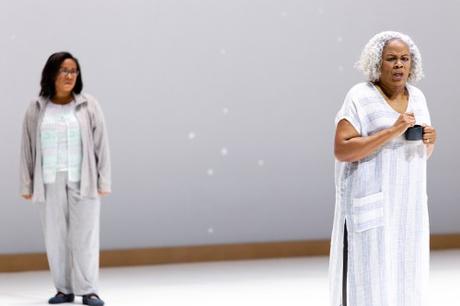
Martha (mezzo-soprano Marietta Simpson) is tormented by strangers | photo courtesy of Opera Philadelphia by Dominic M. Mercier
Simpson delivered a fiery, flawless performance as Martha, whose plaques and tangles increasingly demonized her as the disease progressed. The audience recoils in horror as Simpon cowers under a kitchen table in Scene 5, because she thinks she has lost a pack of matches.
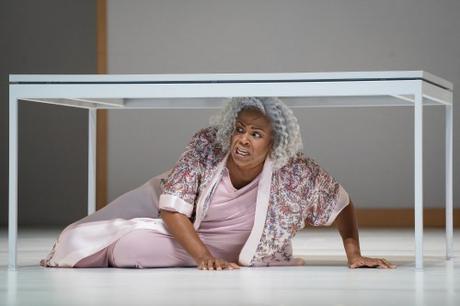
Martha’s hallucination in Scene 5 | photo courtesy of Opera Philadelphia by Steven Pisano
The most sympathetic character is Danny because we experience the entire range of her disease–from onset to severity. Von Stade is simply brilliant in the role. We meet Danny as her son Ira, sung with authenticity by tenor Daniel Taylor, is subjecting his mother to remember a string of words he calls out, a test for cognition. Von Stade genuinely and painstakingly portrays a sympathetic woman of means, who realizes she is going to lose her mind.
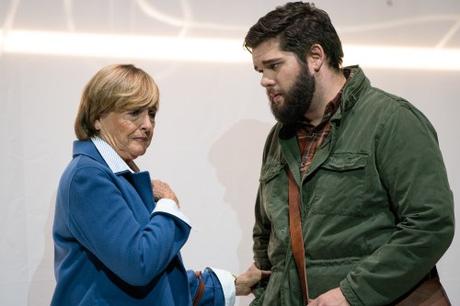
Danny (mezzo-soprano Frederica von Stade) and son Ira (tenor Daniel Taylor) realize she has Alzheimer’s. | photo courtesy of Opera Philadelphia by Steven Pisano
Scene 8 has absolutely chilling moments, including when von Stade, in a moment of clarity, is tortured with the realization of her own mental deterioration and sings, “I’m lost I’m gone I’m lost again I’m gone I’m lost.”
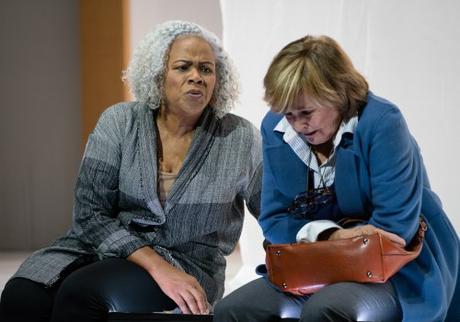
Martha and Danny develop an empathetic bond and then sweet friendship like only small children share. | photo courtesy of Opera Philadelphia by Steven Pisano
The Elder Chorus also contributed to an undercurrent of hopelessness and helplessness, creating an echolalic oratorio of nonsense syllables while drifting on and off stage, to convey the ambient noise and confusion of those suffering from Alzheimer’s experience to a punishing degree.
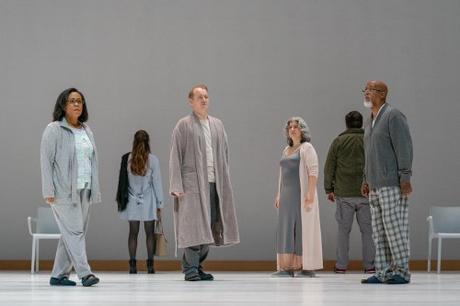
The masterful Elder Chorus –Veronica Chapman-Smith, George Somerville, Maren Montalbano, and Frank Mitchell | Photo courtesy of Opera Philadelphia by Steven Pisano
In what must have been a challenging opera to conduct, maestro Geoffrey McDonald culls a cacophony of sounds, often arrhythmic, from his players, allowing the audience to experience the disorientation Alzheimer’s victims feel as the disease progresses.
